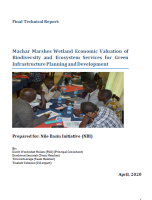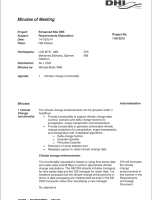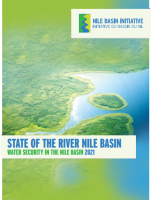Abstract
Report of an economic valuation of biodiversity and ecosystem services of the Machar Marshes wetland to inform green infrastructure planning and development in the face of in situ and ex-situ development interventions. It found that the Machar Marshes wetland provides key provisioning and regulating ecosystem services that directly and indirectly support the livelihood of the local community. Land use land cover (LULC) analysis showed that tree cover and grass land cover show a decreasing trend while crop land, grassland, herbaceous cover, shrub land, shrub land herbaceous cover and flooded tree cover show an increasing trend. The study concluded that the Machar Marshes wetland provides an estimated economic value of USD 622 million per year, of which USD 351.8 million is from provisioning services (i.e. basic economic activities that the local community relies such as crop production, timber production, papyrus harvesting, fishing and so on); USD 262.8 million are from regulating services (carbon sequestration, sediment retention, flood attenuation); and USD 7.3 million from biodiversity ecosystem services. To maintain, conserve and restore Machar Marshes wetland the study recommends (1) conservation options - conservation of the foothills and floodplain of the wetland, restoration of the permanent wetland and maintenance of water inflows to the wetland; (2) collaboration - all key stakeholders should work together to ensure sustainable ecosystem service of the Machar wetland; (3) fast-tracking of sustainable wetland management – by (A) creating awareness about sustainable management of wetlands resources and ecosystems; (B) considering the economic value of the wetland ecosystem services in decision-making (since development processes rely directly on these services); (C) coordinating key stakeholders with strong institutional arrangements, to support conservation and sustainable development options; and (D) introducing incentivized community-based wetland management initiatives, especially in foothill and floodplain areas, to promote conservation options and improve wetland ecosystem services.


